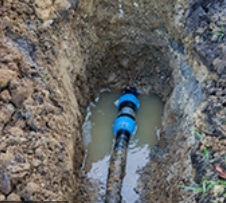Q: A plumber disconnected service from our old well and connected the house to city water. The well was never capped. Could that be the source of our leak under the slab on grade? — Thomas
A: Capping of an old well keeps debris and surface contaminants out of the well in case you want to use it in the future. But a cap would not affect underground leakage. Unless you have an artesian well, which is naturally pressurized by the aquifer and does not need a pump, then an old well is just a hold in the ground and would not be the source of your leak.

However, the tie-in to city water could be leaking. Leaks can occur at fittings or along the length of a pipe, for example, from damage when the hole was backfilled. Underground leaks can be difficult to detect, but wet spots along the side of the house, dampness in the slab, or leaking through the slab can be indicators of a leak.
In extreme cases, you may also hear running water, like an open faucet, through the slab. If you have a leak in a hot water pipe under the slab, you could have warm spots on the floor.
Leaks in your sewer line can also be a source of water under a slab, but these are usually accompanied by a sewage odor.
If your water meter is near the street, then you can check the meter to detect a water-supply leak. Shut off all water in the home (including water supplies to toilets), wait one to two hours, and read the meter again. You can mark the location of the needle or just write down the number. Some meters have leak indicators that will indicate right away if water is flowing. If water is flowing with no interior water use, then you most likely have an underground leak.
If your water meter is in the basement, or along your foundation, then it will not record a leak on the street side of the meter. In that case, you will need a home inspector or plumber with specialized detection equipment to locate the leak. They typically use listening devices or thermal scans to locate the leak. Repairs will involve cutting through the slab and excavation.
Probably not what you want to hear, but better to deal with this now, since an untreated leak can destabilize the soil under the slab and lead to cracks in the concrete and other structural problems. — Steve Bliss, BuildingAdvisor.com
Leave a Reply